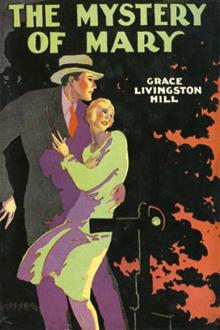The Mystery of Mary - Grace Livingston Hill (reading tree txt) 📗

- Author: Grace Livingston Hill
- Performer: -
Book online «The Mystery of Mary - Grace Livingston Hill (reading tree txt) 📗». Author Grace Livingston Hill
A long, golden brown hair nestling on the collar of the bathrobe gleamed in a chance ray of sunlight. He looked at it reverently, and laid the garment down carefully, that it might not be disturbed. As he lifted the coat, he saw the little note pinned to the lapel, and seized it eagerly. Surely this would tell him something!
But no, there was only the message that she had arrived safely, and her thanks. Stay, she had signed her name "Mary." She had told him he might call her that. Could it be that it was her real name, and that she had meant to trust him with so much of her true story?
He pondered the delicate writing of the note, thinking how like her it seemed, then he put the note in an inner pocket and thoughtfully lifted out the evening clothes. It was then that he touched the silken lined cloth of her dress, and he drew back almost as if he had ventured roughly upon something sacred. Startled, awed, he looked upon it, and then with gentle fingers lifted it and laid it upon his knee. Her dress! The one she had worn to the dinner with him! What did it all mean? Why was it here, and where was she?
He spread it out across his lap and looked at it almost as if it hid her presence. He touched with curious, wistful fingers the lace and delicate garniture about the waist, as if he would appeal to it to tell the story of her who had worn it.
What did its presence here mean? Did it bear some message? He searched carefully, but found nothing further. Had she reached a place of safety where she did not need the dress? No, for in that case, why should she have sent it to him? Had she been desperate perhaps, and——? But no, he would not think such things of her.
Gradually, as he looked, the gown told its own story, as she had thought it would: how she had been obliged to put on a disguise, and this was the only way to hide her own dress. Gradually he came to feel a great pleasure in the fact that she had trusted him with it. She had known he would understand, and perhaps had not had time to make further explanation. But if she had need of a disguise, she was still in danger! Oh, why had she not given him some clue? He dropped his head upon his hand in troubled perplexity.
A faint perfume of violets stole upon his senses from the dress lying across his knee. He touched it tenderly, and then half shamefacedly laid his cheek against it, breathing in the perfume. But he put it down quickly, looking quite foolish, and reminded himself that the girl was still a stranger, and that she might belong to another.
Then he thought again of the story the Judge had told him, and of his own first conviction that the two young women were identical. Could that be? Why could he not discover who the other girl was, and get some one to introduce him? He resolved to interview the Judge about it at their next meeting. In the meantime, he must wait and hope for further word from Mary. Surely she would write him again, and claim her ring perhaps, and, as she had been so thoughtful about returning the hat and coat at once, she would probably return the money he had loaned her. At least, he would hear from her in that way. There was nothing to do but be patient.
Yes, there was the immediate problem of how he should restore his sister's hat and his mother's coat to their places, unsuspected.
With a sigh, he carefully folded up the cloth gown, wrapped it in folds of tissue paper from the empty hat-box, and placed it in his suit-case. Then he transferred the hat to its original box, rang the bell, and ordered the boy to care for the box and suit-case until he called for them.
During the afternoon he took occasion to run into the Judge's office about some unimportant detail of the business they were transacting, and as he was leaving he said:
"By the way, Judge, who was your young woman who gave you such a fright by her sudden disappearance? You never told me her name. Is she one of my acquaintances, I wonder?"
"Oh, her name is Mary Weston," said the Judge, smiling. "I don't believe you know her, for she was from California, and was visiting here only for a few days. She sailed for Europe the next day."
That closed the incident, and, so far as the mystery was concerned, only added perplexity to it.
Dunham purposely remained down-town, merely having a clerk telephone home for him that he had gone out of the city and would not be home until late, so they need not wait up. He did this because he did not wish to have his mother or his sister ask him any more questions about the missing hat and coat. Then he took a twenty-mile trolley ride into the suburbs and back, to make good his word that he had gone out of town; and all the way he kept turning over and over the mystery of the beautiful young woman, until it began to seem to him that he had been crazy to let her drift out into the world alone and practically penniless. The dress had told its tale. He saw, of course, that if she were afraid of detection, she must have found it necessary to buy other clothing, and how could she have bought it with only nine dollars and seventy-five cents? He now felt convinced that he should have found some way to cash a check and thus supply her with what she needed. It was terrible. True, she had those other beautiful rings, which were probably valuable, but would she dare to sell them? Perhaps, though, she had found some one else as ready as he had been to help her. But, to his surprise, that thought was distasteful to him. During his long, cold ride in solitude he discovered that the thing he wanted most in life was to find that girl again and take care of her.
Of course he reasoned with himself most earnestly from one end of the trolley line to the other, and called himself all kinds of a fool, but it did not the slightest particle of good. Underneath all the reasoning, he knew he was glad that he had found her once, and he determined to find her again, and to unravel the mystery. Then he sat looking long and earnestly into the depths of the beautiful white stone she had given to him, as if he might there read the way to find her.
A little after midnight he arrived at the club-house, secured his suit-case and the hat-box, and took a cab to his home. He left the vehicle at the corner, lest the sound of it waken his mother or sister.
He let himself silently into the house with his latch-key, and tiptoed up to his room. The light was burning low. He put the hat-box in the farthest corner of his closet, then he took out the rain-coat, and, slipping off his shoes, went softly down to the hall closet.
In utter darkness he felt around and finally hung the coat on a hook under another long cloak, then gently released the hanging loop and let the garment slip softly down in an inconspicuous heap on the floor. He stole upstairs as guiltily as if he had been a naughty boy stealing sugar. When he reached his room, he turned up his light, and, pulling out the hat-box, surveyed it thoughtfully. This was a problem which he had not yet been able to solve. How should he dispose of the hat so that it would be discovered in such a way as to cast no further suspicion upon the maid? How would it do to place the hat in the hall-closet, back among the coats? No, it might excite suspicion to find them together. Could he put it in his own closet and profess to have found it there? No, for that might lead to unpleasant questioning, and perhaps involve the servants again. If he could only put it back where he had found it! But Cornelia, of course, would know it had not been there in her room all this week. It would be better to wait until the coast was clear and hide it in Cornelia's closet, where it might have been put by mistake and forgotten. It was going to be hard to explain, but that was the best plan he could evolve.
He took the hat out and held it on his hand, looking at it from different angles and trying to remember just how the girl had looked out at him from under its drooping plumes. Then with a sigh he laid it carefully in its box again and went to bed.
The morning brought clearer thought, and when the summons to breakfast pealed through the hall he took the box boldly in his hand and descended to the dining-room, where he presented the hat to his astonished sister.
"I am afraid I am the criminal, Cornelia," he said in his pleasantest manner. "I'm sorry I can't explain just how this thing got on my closet-shelf. I must have put it there myself through some unaccountable mix-up. It's too bad I couldn't have found it before and so saved you a lot of worry. But you are one hat the richer for it, for I paid the bill yesterday. Please accept it with my compliments."
Cornelia exclaimed with delight over the recovered hat.
"But how in the world could it have got into your closet, Tryon? It was impossible. I left it my room, I know I did, for I spoke to Norah about it before I left. How do you account for it?"
"Oh, I don't attempt to account for it," he said, with a gay wave of his hand. "I've been so taken up with other things this past week, I may have done almost anything. By the way, Mother, I'm sure you'll be glad to hear that Judge Blackwell has made me a most generous offer of business relations, and that I have decided to accept it."
Amid the exclamations of delight over this bit of news, the hat was forgotten for a time, and when the mother and sister finally reverted to it and began to discuss how it could have gotten on the closet shelf, he broke in upon their questions with a suggestion.
"I should advise, Mother, that you make a thorough search for your rain-coat. I am sure now that you must have overlooked it. Such things often happen. We were so excited the morning Cornelia missed the hat that I suppose no one looked thoroughly."
"But that is impossible, Tryon," said his mother, with dignity. "I had that closet searched most carefully."
"Nevertheless, Mother,





Comments (0)